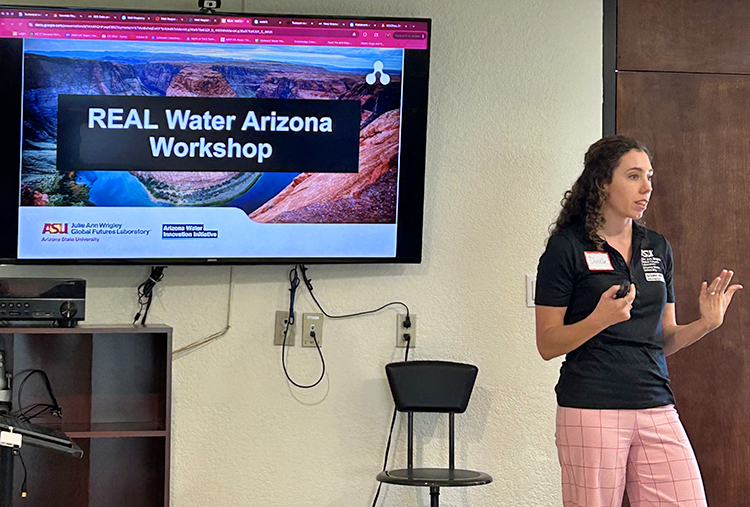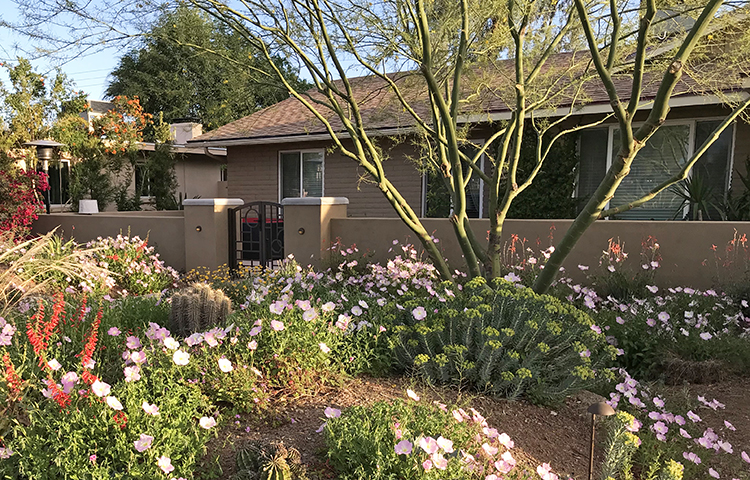
Strengthening water education for real estate professionals
When buying property in Arizona, water is often an important part of the decision, particularly in rural areas. The way real estate agents address questions like how secure the water supply is can influence a buyer’s confidence in their purchase.
As Arizona continues to navigate long-term water challenges, ensuring that agents are informed and equipped to communicate accurately about water is critical for their clients and communities.
That’s the motivation behind REAL Water Arizona – Improving Water Education for Real Estate Professionals, a new project led by Danielle Storey, user experience researcher with the Arizona Water Innovation Initiative (AWII), and Harry Cooper, the initiative’s director of water conservation innovation.
In partnership with the Arizona Department of Real Estate (ADRE) and supported by Impact Water – Arizona, the program is reimagining how water education is taught in the state’s mandatory continuing education course for licensed real estate professionals.
“We want to know how Arizona real estate agents are understanding the water topics being taught to them and how they apply this knowledge to advising clients,” Storey says. “Our project is focused on empowering instructors by focusing on their need for quality, reputable resources about Arizona water.”
Where water meets real estate
Every two years, Arizona’s real estate agents must complete mandatory continuing education credits to renew their licenses, a process that includes one hour on water as part of a “Firewise, Deed Fraud and Water” course requirement that went into effect in 2024. Storey’s team has been closely reviewing how that mandate is playing out statewide.
“We’re assessing the quality of the instruction in the water portion of the course,” Storey says. “We are also assessing whether it’s realistic to cover the relevant water topics in one hour.”
So far, the team has observed 20 continuing education courses, evaluating how much and how well ADRE’s official curriculum is being addressed. They are finding that while some instructors deliver engaging, in-depth lessons, many courses are, for example, limited to statewide information that could be more beneficial if locally tailored.
Beyond content quality, the project also examines what agents and their clients most want to know — from water rights and long-term availability to costs and quality — and how those concerns appear in real-world transactions and disclosure forms.
Listening and learning with agents
To get a full picture, Storey’s team has paired course observations with surveys and interviews, as well as targeted workshops designed to spark candid conversation. Over the past year, they’ve completed over 20 interviews and hosted nine workshops across six counties.
“We didn’t want the workshops to feel like lectures,” says Storey. “We wanted to go above and beyond what happens in the mandatory one-hour course and talk with agents about how water comes up in transactions and what kind of additional education would help them.”

These voluntary workshops attracted agents who were genuinely interested in water. Participants shared how clients often ask about groundwater reliability, wells or water quality — and how unprepared they sometimes feel to answer those questions confidently.
Storey notes the discussions revealed regional differences, with urban agents focused on regulated Active Management Areas (AMAs) and rural agents grappling with more uncertainty in unregulated zones. Together, those insights are helping the REAL Water team and ADRE identify where educational support is most needed.
The initial results have shown that instructors and agents alike tend to shy away from crucial but complex subjects such as stream adjudications and the state’s Assured and Adequate Water Supply program.

“Agents don’t usually speak in terms like assured water,” says Storey. “They might say ‘a hundred years of water,’ but they don’t necessarily understand the legal or programmatic context behind that.”
These findings suggest that the state’s one-hour course can only go so far. That’s why REAL Water will pair ADRE’s water curriculum with a new digital learning portal offering at least two hours of water focused curricula that meets the needs of real estate professionals in both the residential and commercial sectors.
The platform will allow instructors to tailor content by region — for instance, by focusing on local water supply maps or regulations specific to places like Prescott, Tucson or the Verde Valley — and incorporate up-to-date online tools from the Arizona Department of Water Resources and the Arizona Water Blueprint from the Kyl Center for Water Policy.
Building understanding and confidence beyond compliance
Storey emphasizes that REAL Water’s purpose extends beyond checking a box for license renewal. It’s about helping agents feel capable of explaining water issues with confidence and understanding their role in the state’s water future.
For example, although ADRE’s outline doesn’t currently require it, Storey and Cooper view conservation education as essential.

“We know that understanding conservation at both the household and management-area levels can ease people’s worries about availability,” Cooper says. “If agents can connect those dots, they can help clients see that water security is something everyone contributes to.”
Real estate agents are often one of the first professions in contact with new, prospective residents or businesses.
“What they say, or don’t say, can make a huge difference to our regional economy and sustaining our culture of conservation,” Cooper added.
In addition, when agents understand how AMAs are designed to safeguard long-term supply, Storey says, “they gain the ability to speak more confidently with out-of-state buyers and investors who may assume Arizona’s water situation is dire when in fact, strong management plans are in place in AMAs.”
Real-world insight from both sides of the industry
Storey’s interest in the issue is both professional and personal.
“I’m from Arizona, and water is always top of mind. But I first got really interested in water resources when I spent a few years as a real estate agent in Austin, Texas after college,” she says. After returning to Arizona and joining AWII, she recognized that real estate professionals are a key audience for outreach.
“I sat through a pretty poorly taught water course when I renewed my own license, and the more I talked with colleagues here at ASU I realized that real estate agents were a big community that we were hoping to reach,” Storey says. “That’s when I knew there was an opportunity to make this educational experience more meaningful for licensees.”
The project also explores how water awareness differs across the industry. Commercial brokers, Storey explains, often operate at a strategic business to business level — analyzing long-term supply and risk maps to advise clients. Residential agents, particularly in rural areas, engage in more personal, property-specific conversations where water quality and availability can be more immediate concerns.
Looking ahead
The REAL Water team will present its quality assessment report to ADRE this fall, followed by a public webinar for instructors. From there, the team will focus on building out the new digital learning portal addressing additional water topics in more depth than the mandatory course.
“We’re taking all the water expertise we have at ASU,” Storey says, “and helping them understand how agents feel about the existing water content in their course, as well as how to meet the needs of a community of agents that are eager to learn more.”
ADRE has been an enthusiastic partner.
“Arizona has a special relationship with water, and just like sunshine and saguaros, it plays a big role in what makes a property tick – and what it’s worth,” says Mandy Neat, Deputy Commissioner at ADRE. “Understanding the basics helps everyone involved. We are excited to be collaborating with ASU to ensure quality education to all real estate licensees.”
Story originally published at ASU News.
Related stories: